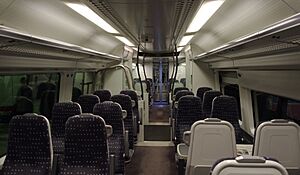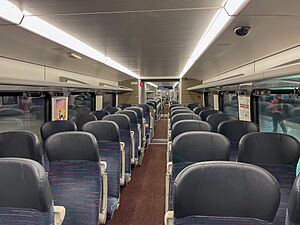Stansted Express facts for kids
 |
|
|---|---|
|
A Greater Anglia Stansted Express Class 745/1 at Wilsons Lane near Marks Tey
|
|
| Franchise(s): | Part of Greater Anglia 15 October 2016 – 2025 Part of Abellio Greater Anglia 5 February 2012 – 15 October 2016 Part of National Express East Anglia 1 April 2004 – 4 February 2012 Part of West Anglia Great Northern 5 January 1997 – 31 March 2004 |
| Main Route(s): | Liverpool Street – Stansted Airport (West Anglia Main Line) |
| Fleet size: | 10 Class 745/1 FLIRT |
| Stations called at: | 5 |
| National Rail abbreviation: | SX |
| Parent company: | Greater Anglia |
The Stansted Express is a special train service that connects London Liverpool Street directly to London Stansted Airport. It's like a fast shuttle for people traveling to and from the airport. This service is part of a bigger train company called Greater Anglia.
Contents
History of the Stansted Express
The Stansted Express service started because British Rail (BR) extended its train lines in 1986. They built a new branch line specifically to reach London Stansted Airport. A new airport terminal was planned to open in 1991, which meant many more passengers would need to travel there.
To handle this, British Rail decided to build special trains just for the Stansted Express. These trains were called Class 322 units. The service was run by a part of British Rail called Network SouthEast.
Later, in 1996, British Rail was privatized, meaning private companies took over running the trains. The Stansted Express became part of different train companies over the years. First, it was part of West Anglia Great Northern. Then, in 2004, it joined the Greater Anglia franchise, which was run by One Railway (later called National Express East Anglia). Since February 2012, the service has been operated by Abellio Greater Anglia, which is now known simply as Greater Anglia.
How the Service Works
Train Stops and Travel Time
Unlike some other airport trains in London, the Stansted Express makes one stop between London and the airport. It stops at Tottenham Hale. This stop is useful because you can change there to the London Underground Victoria Line.
The journey from London Liverpool Street to Stansted Airport takes about 46 to 56 minutes. Trains leave every 15 minutes, so you don't have to wait long.
Tickets and Payments
Stansted Express offers different types of tickets. You can buy a single ticket for one way or a return ticket for a round trip. There are also discounts if you book early, or if you travel with a friend (WebDuo) or in a group (GroupSave).
Your Stansted Express ticket can also give you special "2FOR1" offers. This means you can get two tickets for the price of one at some popular London attractions. These include places like The London Eye, Madame Tussauds, the Sea Life Centre, and Thorpe Park resort.
It's important to know that you cannot use Oyster or Contactless payment cards for travel to or from Stansted Airport. These cards work for journeys between Liverpool Street and Tottenham Hale, but not for the full trip to the airport. You need to buy a separate ticket for the airport journey.
Current Services
As of May 2025, here's how the Stansted Express trains run during off-peak times from Monday to Friday:
| Stansted Express | ||
|---|---|---|
| Route | tph | Calling at |
| London Liverpool Street - Stansted Airport | 2 |
|
| 2 |
|
|
Understanding Payment Issues
Transport for London has a system where you can use a contactless payment card or Oyster card to pay for public transport. You tap your card at the start and end of your journey, and the system figures out the correct fare.
However, Stansted Airport is quite far from London. It is outside the area where this "tap-in, tap-out" system works. This means you must buy a regular ticket to travel to Stansted Airport.
Some passengers get confused because Stansted Airport has "London" in its name. They might think they can use their contactless card, just like at other London stations. Stations served by the Stansted Express in London do have card readers because other trains use them. So, it's possible for someone to tap their card to enter a London station, board a Stansted Express train, and then travel to Stansted Airport. At the airport, they might be charged a penalty because their card wasn't valid for that part of the journey.
This situation has caused some confusion for travelers. In September 2024, it was reported that Stansted Express services to Stansted Airport are planned to be included in contactless and Oyster card payments from the second half of 2025. This change is supported by government funding and aims to make travel easier and clearer for everyone.
Train Fleet
Current Trains
The Stansted Express service uses modern trains called Class 745/1s. These trains are part of a larger plan to add many new carriages to the UK's passenger rail system. The first of these new Class 745/1 trains started carrying passengers on July 28, 2020.
These trains are known as FLIRT trains and are EMUs, which means they are powered by electricity and can run as a complete unit.
| Class | Image | Type | Top speed | Number | Routes operated | Built | |
|---|---|---|---|---|---|---|---|
| mph | km/h | ||||||
| 745/1 FLIRT | 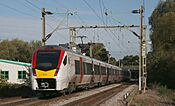 |
EMU | 100 | 161 | 10 | Liverpool Street – Stansted Airport | 2018–2020 |
Past Trains
The Stansted Express has used several different types of trains over the years.
- It first used Class 322 EMUs.
- In 2000, these were replaced by Class 317/7 EMUs.
- Later, in 2006, more Class 317/8s were added.
- From 2011 to 2020, the service used Class 379 Electrostar trains before the current Class 745/1s took over.
| Class | Image | Type | Top speed | Number | Routes operated | Built | Withdrawn | |
|---|---|---|---|---|---|---|---|---|
| mph | km/h | |||||||
| 317/7 | 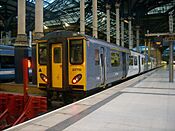 |
EMU | 100 | 160 | 9 | Liverpool Street – Stansted Airport | 1981–1982 | 2011 |
| 317/8 | 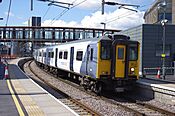 |
EMU | 100 | 160 | 12 | 1981–1982 | 2011 | |
| 322 | 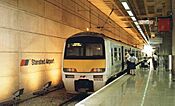 |
EMU | 100 | 160 | 5 | 1990 | 2000 | |
| 379 Electrostar |  |
EMU | 100 | 160 | 30 | 2010–2011 | 2020 | |
See also
 In Spanish: Stansted Express para niños
In Spanish: Stansted Express para niños
- Gatwick Express - a similar express train service between London Victoria station and Gatwick Airport
- Heathrow Express - a similar express train service between London Paddington station and London Heathrow Airport
- Luton Airport Express - a similar express train service between London St Pancras station and London Luton Airport
 | Mary Eliza Mahoney |
 | Susie King Taylor |
 | Ida Gray |
 | Eliza Ann Grier |


